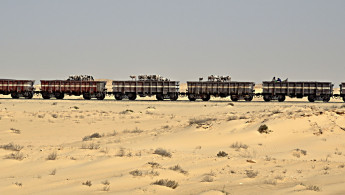Mauritania miners strike for justice
Under the harsh Saharan sun in Mauritania lies an even more merciless world of cramped tunnels, dust and darkness.
The country, which lies at the periphery of the Arab world, is reliant on its minerals to keep its economy afloat and approximately 75 percent of export earnings come from mining and hydrocarbons.
Yet for the workers in these mines and quarries, life is hard, sometimes "inhumane".
Conditions have become so bad at one mine that 4,000 miners have refused to work.
They say that they are subject daily to the dangers of quarry dust, toxins, and other risks posed from separating iron ore from other impurities with little response from management.
"I nearly died twice," says Adil Weld Taj al-Din, a miner with the National Company for Industry and Mines (SNIM).
"The last time I was nearly decapitated but for the grace of God."
Dangerous conditions
He says that he risks his life daily for the company, and even when workers are hurt, there are other challenges to deal with.
"Many mine workers find it hard to receive medical referrals after work accidents, as the managers evaluate the yearly accidents and bribe workers with holiday days instead of giving them a referral," Din says.
Unions are doing their best to tackle these problems and ensure that workers get better treatment and labour under safer conditions.
"The conditions in which miners work can be described as inhumane at best. The mountains they work in are severely hot in the summer and severely cold in the winter, yet miners work for long hours," says Mohammed Weld al-Zaqqani, a union leader.
"The lack of official care and the inhumane treatment has made miners revolt against their employers many times," he adds.
Zaqqani complains that despite the workers at SNIM mining 13 million tons of minerals for the company, they are marginalized by the management.
"They are able to produce 15 million tons a year if the company provides them with the incentives they deserve, however the company does not care about real workers," he says.
One worker, who wanted to remain anonymous, says even above the mines, work is becoming unbearable.
"I lost three fingers while working in the maintenance department for SNIM," he says.
"The company did not give me a referral, and instead, my manager gave me some time off, additional hours and financial compensation. But that did not cover the cost of the medical treatment."
Downing tools
The worker said that hundreds of retired workers from the company continue to suffer from conditions they inherited in the mines and with no assistance from the company.
In its defence, the company says that it provides its workers with wages that are higher than the average Mauritanian salary.
| Medical and social services provided by the company were only achieved after a long struggle. - Mohammed Weld Yahi |
According to its public statements, SNIM provides full medical coverage for its employees through its own hospitals, in addition to other services such as subsidised housing and food.
In the past five years, iron ore production in Mauritania has witnessed an unprecedented increase in prices with the commodity more than doubling in value, jumping from $60 to $150 per ton.
This has led unions to demand that mining companies pay their employees additional production bonuses, and the SNIM has responded positively paying 7 percent of profits to workers in 2011 and 2012.
However, when production fell, the company refused to continue this practice.
This led SNIM workers to organise a strike last year, which forced the company to increase wages for its staff.
However, shortly after an agreement was signed between the company and the workers, SNIM reneged citing the collapse of iron ore prices.
"Medical and social services provided by the company over the past few years were only achieved after a long struggle by the workers," says Mohammed Weld Yahi, a legal expert.
"However, the company has gone back on its word and the promises it had made, which is a flagrant violation of the law."
On 30 January 2015, SNIM workers at the iron mines of Zouerate, West Mauritania, downed tools and began an open-ended strike that is now entering its second month.
They were joined by other sympathetic miners, railroad workers and dockers. It has caused iron ore exports in the country to almost cease completely and has the potential to cripple the Mauritanian economy.
SNIM allegedly responded by firing 304 strikers, but with massive support, the strike has the potential to shake the whole of Mauritania into realising there is a human cost behind its invaluable mineral wealth.
This article is an edited translation from our Arabic edition.



